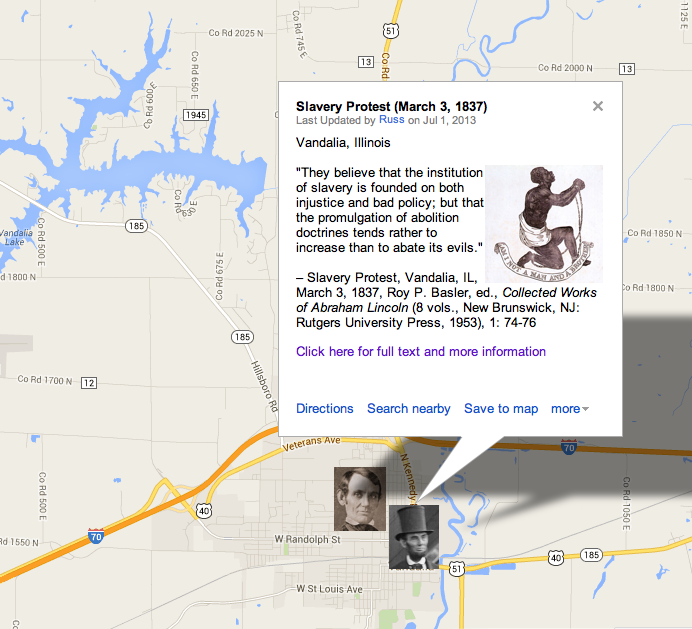Contributing Editors for this page include Greg O’Reilly
Ranking
#53 on the list of 150 Most Teachable Lincoln Documents
Annotated Transcript
On This Date
HD Daily Report, March 3, 1837
The Lincoln Log, March 3, 1837
Custom Map
Close Readings
Posted at YouTube by Understanding Lincoln course participant Greg O’Reilly, August 2014. You can read a transcript of this video here.
How Historians Interpret
“Lincoln wrote a protest and circulated it among his colleagues, all of whom refused to sign except for Stone, a native of Vermont and a graduate of Middlebury College. Stone was not seeking reelection because he would soon become a judge. Lincoln declared in the document which he and Stone spread on the journal of the House of Representatives ‘that the institution of slavery is founded on both injustice and bad policy,’ foreshadowing his great 1854 Peoria speech denouncing the ‘monstrous injustice of slavery.’ In 1860, a newspaper widely regarded as his organ explained that ‘Lincoln could not, and did not vote in favor of the resolutions . . . because the old Calhoun doctrine embraced in the second of the series [‘that the right of property in slaves is sacred to the slave-holding states by the Federal Government’] was abhorrent to his ideas of the true meaning of the Constitution.’ To announce that ‘slavery is founded on both injustice and bad policy’ was a remarkably bold gesture for 1837, when antislavery views enjoyed little popularity in central Illinois – or elsewhere in the nation.”
“Lincoln’s ‘protest’ differed from the resolutions primarily in its strong language against slavery and in omitting the description of slaveholders’ property rights as ‘sacred.’ It foreshadowed Lincoln’s public stance in the 1850s: slavery was unjust; northerners had an obligation to respect the constitutional compromises that protected the institution; the national government had the power to act against slavery in the District of Columbia; and Lincoln was not an abolitionist.”
—Eric Foner, The Fiery Trial: Abraham Lincoln and American Slavery, (New York: W.W. Norton & Company, 2011), p.26
“He understood but would not join abolitionist organizations that attacked the personal and human horrors of the institution. Lincoln first spoke publicly against slavery in 1837 with a short protest against resolutions that attacked abolition societies and defended states’ rights to property in slaves. Joining with Dan Stone, a fellow Springfield lawyer and Whig, Lincoln called slavery unjust and bad policy but asserted that abolition societies ‘tend[ed] rather to increase than to abate its evils.'”
—Phillip S. Paludan, “Lincoln’s Prewar Constitutional Vision” in Journal of the Abraham Lincoln Society 15 (1994)
NOTE TO READERS
This page is under construction and will be developed further by students in the new “Understanding Lincoln” online course sponsored by the House Divided Project at Dickinson College and the Gilder Lehrman Institute of American History. To find out more about the course and to see some of our videotaped class sessions, including virtual field trips to Ford’s Theatre and Gettysburg, please visit our Livestream page at http://new.livestream.com/gilderlehrman/lincoln

